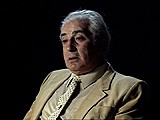You searched for: ���������������������������������������������������������������������cxfk69���just
<< Previous | Displaying results 31-40 of 572 for "���������������������������������������������������������������������cxfk69���just" | Next >>
-
Judith Meisel describes arrival at the Stutthof camp
Oral HistoryUpon her father's death, Judith and her family moved to Kovno. Soon, they were confined to the ghetto, which the Germans formed in 1941. Judith, her mother and sister were deported to Stutthof, where her mother died. Judith and her sister escaped from a death march out of Stutthof. They posed as non-Jews, found farm work and eventual refuge in Denmark. Their brother survived Dachau.
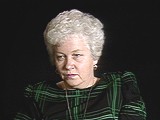
-
Irene Hizme and Rene Slotkin describe being reunited in the United States in 1950
Oral HistoryIrene and Rene were born Renate and Rene Guttmann. The family moved to Prague shortly after the twins' birth, where they were living when the Germans occupied Bohemia and Moravia in March 1939. A few months later, uniformed Germans arrested their father. Decades later, Irene and Rene learned that he was killed at the Auschwitz camp in December 1941. Irene, Rene, and their mother were deported to the Theresienstadt ghetto, and later to the Auschwitz camp. At Auschwitz, the twins were separated and subjected…
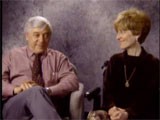
-
Beatrice Stern Pappenheimer describes struggle among prisoners for meager food rations in Gurs camp
Oral HistoryBeatrice's family lost their textile business and home when the Nazis barred Jews from owning property. The family was deported to camps. Beatrice, her sister, and their mother were sent to Gurs. The Children's Aid Society (OSE) later placed the girls in homes and convents, where they feared Allied bomb attacks, but escaped the horrors of camp life. Their parents perished.

-
Anita Magnus Frank describes hiding in the Netherlands
Oral HistoryWhen the war began, Anita and her family lived in Breda, the Netherlands. With the 1940 German occupation, they went into hiding and took on new names that shielded their Jewish identity. Anita and her brother first were hidden in a non-Jewish neighbor's home, and later by a Quaker family near Utrecht. Anita, her parents, brother, and two sisters survived the war.
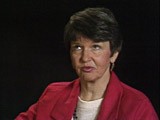
-
Steven Springfield describes the treatment of Jews in the Riga ghetto
Oral HistoryThe Germans occupied Riga in 1941, and confined the Jews to a ghetto. In late 1941, at least 25,000 Jews from the ghetto were massacred at the Rumbula forest, near Riga. Steven and his brother were sent to a small ghetto for able-bodied men. In 1943 Steven was deported to the Kaiserwald camp and sent to a nearby work camp. In 1944 he was transferred to Stutthof and forced to work in a shipbuilding firm. In 1945, Steven and his brother survived a death march and were liberated by Soviet forces.
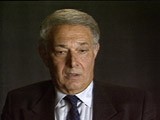
-
Sandor (Shony) Alex Braun describes how music gave him the strength to survive while imprisoned in concentration camps
Oral HistoryShony was born to religious Jewish parents in a small Transylvanian city. He began to learn the violin at age 5. His town was occupied by Hungary in 1940 and by Germany in 1944. In May 1944, he was deported to the Auschwitz camp in Poland. He was transferred to the Natzweiler camp system in France and then to Dachau, where he was liberated by US troops in April 1945. In 1950, he immigrated to the United States, and became a composer and a professional violinist.
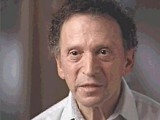
-
Lucille Szepsenwol Camhi describes saying goodbye to her mother when leaving for Vilna with her sister
Oral HistoryLucille's father died three months before she was born. Lucille's mother decided to immigrate to the United States with Lucille and her sister, Fejga. They completed all the paperwork, but were unable to get their final papers because of the German invasion of Poland in 1939. Volozhin was in the Soviet-occupied zone of Poland. Lucille and her sister feared arrest by the Soviets because they were members of a Jewish Zionist youth group. The girls fled to Vilna, where their mother later joined them. Their…
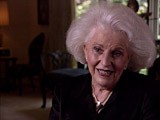
-
Agate (Agi) Rubin describes the role of interpersonal bonds in surviving the Auschwitz camp
Oral HistoryIn April 1944, after the German occupation of Hungary, Agi, her mother, six-year-old brother, and aunt were forced into the Munkacs ghetto. Before deportation to Auschwitz, Agi was forced to work in the ghetto's brick factory. At Auschwitz, Agi, then 14 years old, was chosen as part of a Sonderkommando. This forced-labor detachment had to sort the clothing and possessions of inmates and victims at Auschwitz. In January 1945, Agi and other prisoners were forced on a death march from Auschwitz. She was…
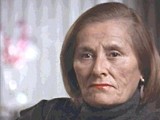
-
Kate Bernath describes the psychology of survival in Auschwitz
Oral HistoryAfter the German invasion of Hungary in 1944, Kate and her family were deported first to the Kosice ghetto and then to the Auschwitz camp in Poland. Kate and other prisoners were sent on to the Plaszow camp, also in Poland. As partisan raids increased and the front drew closer, they were sent back to Auschwitz in August 1944. Kate was then selected for forced labor at a Messerschmidt factory in Augsburg, Germany. The prisoners were deported as Allied attacks intensified. Kate was eventually liberated after…
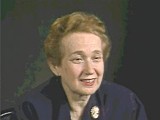
-
Sam Itzkowitz describes a death march from Landsberg, a subcamp of Dachau, to the Bavarian Alps
Oral HistoryThe Germans invaded Poland in September 1939. When Makow was occupied, Sam fled to Soviet territory. He returned to Makow for provisions, but was forced to remain in the ghetto. In 1942, he was deported to Auschwitz. As the Soviet army advanced in 1944, Sam and other prisoners were sent to camps in Germany. The inmates were put on a death march early in 1945. American forces liberated Sam after he escaped during a bombing raid.
